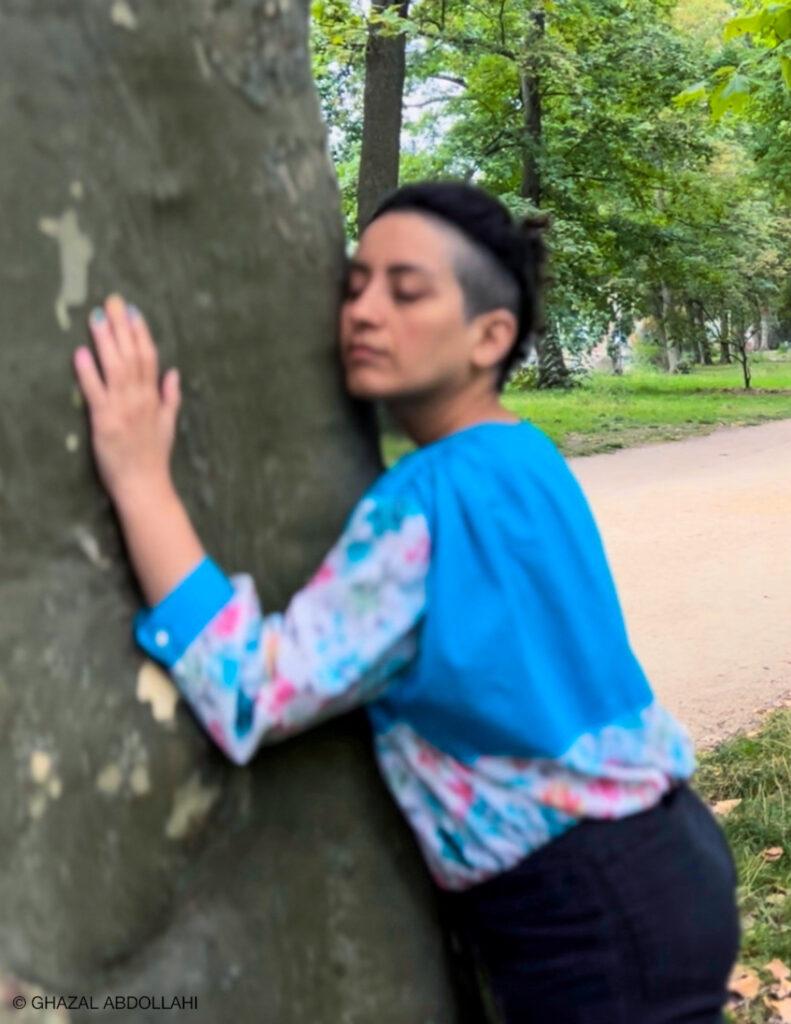Hami
Clinical Art Therapist (MA) in training,
Somatic EMDR Practitioner,
Psychosocial counselor,
Mediator,
MBM Practitioner

‘’Arriving home in our body and being present may be the most revolutionary act we can begin with’’
I am Hami (hami,-, they), born in 1981. As an explorer, lifelong learner, and much more, I embrace a journey of fluidity, self-discovery, healing, and growth. Among many identities, my lived experience includes being trans, non-binary, queer, PoC, semi-disabled, neurodivergent, a survivor, and having an exile background
These aspects do not wholly define who I am but instead shape my daily life experiences in numerous ways. In this context, I also hold privileges in terms of education and residency status, though these were earned through significant struggles arising from my disadvantages.
In my pursuit of growth, justice, and liberation, I have accessed resources that have often been colonized or appropriated from various BIPoC communities. This access has occurred through the survival wisdom of my own ancestral medicine elders, grassroots efforts, as well as institutional education in fields such as Holistic Therapy (Heilpraktiker), Clinical Art Therapy (MA), Somatic Training, Somatic BLS/EMDR Therapy, Mind-Body Medicine, trauma-informed Sexological Bodywork, Fine Arts, Comparative Studies of Religion and Mysticism, Psychology, and Social Studies. Currently, I am continuing my education in Gestalt Therapy.
In my practice, I lean on ancestral wisdom, life experiences, intuition, insights from plant medicine, and various BIPoC communities to develop healing practices with a decolonial lens. Through a trauma-aware, intersectional approach, I support individuals and groups in reclaiming internal and collective healing, re-empowerment, and transformation resources through creativity, ھوﻣﺎHouma/somatic practices, body-mindfulness techniques, and conscious sexuality tools.
I speak Farsi, English and German.
I offer:
Art therapy session: A trauma-informed art therapy session focused on prevention within an intersectional framework, using creative expression tools to help individuals and groups address, explore, and process emotional, psychological, and environmental challenges. These sessions create a safer, re-empowering space where clients can externalize their experiences, navigate challenges, and strengthen their emotional well-being, resilience, and sense of self-agency.
Somatic EMDR/BLS session: This trauma-informed session integrates somatic experiencing with EMDR (Eye Movement Desensitization and Reprocessing) and BLS (Bilateral Stimulation) techniques to help clients process trauma, reduce anxiety, and restore emotional balance. This approach targets embodied emotional pain for gentle processing, enhances well-being, and promotes self-regulation, potentially facilitating transformative healing without requiring individuals to relive every detail of distressing experiences.
Somatic session: A trauma-informed session aimed at supporting individuals by tuning into the body to address the root causes of mindset issues, emotions, patterns, and trauma within an intersectional framework. This foundational practice helps decolonize the body-mind connection while potentially fostering healing, re-empowerment, and transformation through techniques that release and transform stored emotions. The session integrates various somatic techniques, including TRE (Tension & Trauma Releasing Exercises), EFT (Emotional Freedom Techniques), Authentic Movement, Body-Mind Centering, Autogenes, and others.
Psychosocial counseling: Oppression-aware, trauma-informed counseling, based on a psychosomatic approach. Providing support and re-empowering tools in the process of overcoming psycho-social/political, environmental, and emotional struggles that affect health and well-being.
MBM (Mind-Body Medicine) Skills Groups Small skills groups (maximum of 8 participants) focused on interdisciplinary approaches combining modern medicine, holistic and somatic therapy techniques, body mindfulness, and creative arts therapy.
More about MBM: https://cmbm.org/
Mental Health and Self-Collective Care in Political Context
Creating content and organizing workshops, seminars, retreats, and educational programs for activists and other groups.
A few words to give you a sense of my approach
Health and Politics: The discourse around health, including mental health, psychology, and care, has been deeply individualized under colonial and neoliberal wellness culture. Collective care has been separated from self-care, and self-care reduced to a commodified package shaped bycapitalism. Modern medicine often fails to adopt an intersectional approach. Most diagnoses and treatments are centered on and normalize the white, cisgender, heterosexual body and psyche, ignoring diverse realities. Western science has historically been dominated by cisheteronormative white men, whose biases have shaped its frameworks and practices.
Colonial Dichotomies: In many older cultures, the body and mind were, and often still are, seen as inseparable. The binary thinking imposed by modern colonial systems enforces a harmful mind-body split, negatively impacting both individual and collective well-being. This divide is also seen in the hesitation to recognize the importance of collective mental health and the harm caused by oppression and colonial ci/systems.
Holistic Approach: Sustainable and impactful practices that view the whole person, body, mind, and emotions, within a social and political context have roots in older cultures of BIPoC communities. These practices were often colonized, appropriated, and stripped of their origins, and are now primarily accessed through institutionalized somatic therapy, creative art therapy, bodywork, sexological bodywork, and conscious sexuality practices. Unfairly, the very communities that inspired these practices often have the least access to them due to ongoing colonization, capitalism, white supremacy, and intersecting ci/systems of discrimination. To address this, sliding scales are available to make these services more accessible for QTINA* BIPoC individuals.
You can read more about me and my services here:
www.houmartic.com
@houmartic_init
To book my services, please contact me here: info@houmartic.com
